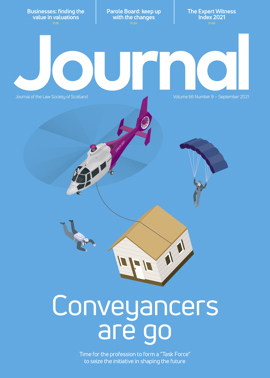Law lessons learned

“A man’s mind, stretched by new ideas, may never return to its original dimensions.” (Oliver Wendell Holmes Jr)
For as long as there has been formal education, students have been studying law. There are times when it feels like nothing has changed, alas, albeit lectures are no longer delivered in Latin and there is greater diversity in the student body. That is until a pandemic swept the globe and, since March 2020, fundamentally changed the way in which students in Scotland study law. Following on from Dr Michael Randall’s article at Journal, May 2021, 18, I want to look at how the pandemic has impacted how legal education
is delivered in Scotland.
In early 2020, my peers and I joked that a new and other-worldly virus might halt our studies and save us from taking the dreaded company law exam. However, come 23 March, Boris Johnson and Nicola Sturgeon confirmed that coronavirus would require a strict lockdown and a legal prohibition on non-essential activities. Still, we thought, this would only last a few weeks and we would be back to the routine of studies by the end of the Easter break.
It is now September 2021 and COVID-19 is still the dominant factor in our lives. It has impacted everything we do and has fundamentally changed how higher education has been delivered. Without any choice, students and academics had to adapt to keep working, and most of the adaptations have become the new normal.
For better or worse, the pandemic has provided ample opportunity for reflection. It would be wrong to think that the study of law is an exception from this. Has the pandemic been the catalyst for change we have needed? Or, has it shown that the traditional method of delivery is best? This article is not a criticism or a response to how I study law; rather it explores how the course is delivered and what, if anything, ought to change as we emerge from this arduous period of our lives.
Well, what has worked?
First and foremost, it must be recognised that Scots law students were still able to continue their studies despite successive lockdowns. One only has to look at Scottish dental schools, where each year group must now take an additional year of study to catch up, to see what could have been. Law, then, is clearly an adaptable course.
The most evident change was an overnight one from lectures being in-person to almost all being made available as pre-recorded online videos. No longer were students acting as note-taking automatons: we could now work to our own pace in a time that best suited each student’s personal circumstances. When talking to my peers, there is an overwhelming consensus that this method of delivery has enabled them to spend more quality time with their lectures and as a result have a greater understanding.
Courses, panel discussions and networking events also made a move online. Pre-pandemic, there was simply not enough time in the working week – nor enough money to pay for travel – for a majority of students to attend as many of these events as they would have liked. The Law Society of Scotland’s Law Fair in October 2020 was a resounding success by being available via Zoom all day for students to drop in and out to fit their schedules. The past year has given students the opportunity to attend more events than is usually possible. It would be a real loss to potentially limit student engagement by removing an accessible mode of attendance – although, as I will come on to, there is still a need for in-person engagement.
Assessments, too, have had to adapt. With exam halls closed there has been a greater emphasis on coursework and practical assessments. This meant students no longer had to regurgitate information, as is typical in a traditional exam. Now arguments have had to be developed and a better understanding demonstrated. There is much debate on whether timed examinations are the best way to assess students. COVID-19 has shown that effective assessment can be carried out by using a whole host of more “modern” methods.
The question on how students are assessed is by no means a post-pandemic discussion. Abertay University lecturer in law, Jade Kouletakis, has an interesting pre-pandemic article directly in point, in volume 5, issue 3 of The Online Journal of Quality in Higher Education, titled “Good practice and the UK LLB degree or: how I learned to stop worrying and love the 21st century.”
What have we missed?
Dr Randall presented pressing concerns about students that have been exacerbated by the pandemic. A move to blended learning may well be better, but only where each student has equal access to this mode of learning. The digital divide has never been more evident. Society would be doing a disservice to students if this divide is not bridged.
With law libraries closed, the pandemic highlighted issues on access to materials. There was no real problem with sources such as cases and legislation, which are almost always accessed online. What was more challenging was finding textbooks and journals, which are not as easily accessible online compared to primary legal sources. The past 18 months have shown that legal literature must be more accessible and affordable for students and institutions alike.
There is also the difficulty that not every household, for a number of reasons, may be an ideal environment for learning. A legal education in Scotland should be an equaliser. We all follow the same syllabus and meet the same accrediting standards. We cannot create a situation where some do better due to individual circumstances, nor can we limit who can study law post-pandemic. The profession has made positive steps forward in recent years in widening access to a Scots law degree, particularly with initiatives such as the Lawscot Foundation. This progress should only continue: any step backwards would be detrimental to the profession as a whole.
Universities are not just about learning; they are incredibly social places. The change in delivery meant that for a while studying law became very isolated. Moreover, this meant that mental health and student wellbeing were tested to the extreme. It is very difficult to replicate the university experience anywhere other than lecture theatres and student unions.
If there is to be a change in delivery, we need to be careful not to turn the legal profession into a digital sector. Many students are attracted to law because they want to work for and with people. It is at university where networking begins. We are lucky in Scotland to have a close-knit legal profession. Whatever approach is adopted going forward, it needs to keep law people focused and closely bonded. If lost, this could be the most difficult thing to bring back.
Going forward
We do not want to look back on a missed opportunity to potentially update legal education by assessing the pros and cons of the past 18 months. Speaking to students and academics alike as a student representative, I have realised that we are all discussing the future of the profession and possible changes. This is by no means the beginning of a manifesto for change; it should be viewed as the basis for a debate on the future of legal education in Scotland.
Blended learning appears to be the favoured approach going forward. If adopted, it should realise all of the benefits developed during the COVID era. This should mean that students are able to reach a better understanding of the course content, be assessed in a way that challenges this understanding and move away from a process of copying and pasting. Blended learning, however, should not mean a complete move away from in-person delivery. Instead, it should focus on creating quality in-person experiences that allow for networking, the pooling of ideas and debates. Ultimately it will not be worth the change if it does not affect all students equally and allow for fair access into the profession.
The pandemic has shown us that we work within an incredibly adaptable sector and that we should not necessarily oppose or be frightened of change. As you read this article, students will be preparing to begin the new academic year in law schools across Scotland. It will be interesting to see whether the new academic wonts developed over the past 18 months become the norm, and whether the ongoing discussion on how we study law evolves into something greater. This is still very much a dynamic situation and – at the time of writing – COVID is still rearing its ugly head. I believe we should continue to adapt and build on the lessons learned.
It remains to say that we should all recognise an incredible achievement by students and academics for triumphing over the pandemic.
I would be interested to hear the views of practitioners, academics and fellow students on this area. Do get in touch on 1805328@abertay.ac.uk
Regulars
Perspectives
Features
Briefings
- Civil court: Legacy of COVID
- Corporate: The enigma of economic duress
- Employment: where will work be found?
- Intellectual property: David v Goliath battle continues
- Agriculture: Crofting disputes: some first principles
- Sport: Arbitration – within the rules?
- Property: ADS: the hidden traps
- In-house: On harm, stakeholders and risk management
In practice
- Ask Ash: Colleague's chat is my privacy
- Lockdown no more
- The Word of Gold: The potency of passion
- Get interactive at the Law and Technology Conference
- Ten red flags for conveyancers
- The Eternal Optimist: So, what do you want to be?
- Commissary: the top 10 failings
- Mobility challenges – and the kindness of strangers
- When all is remote






